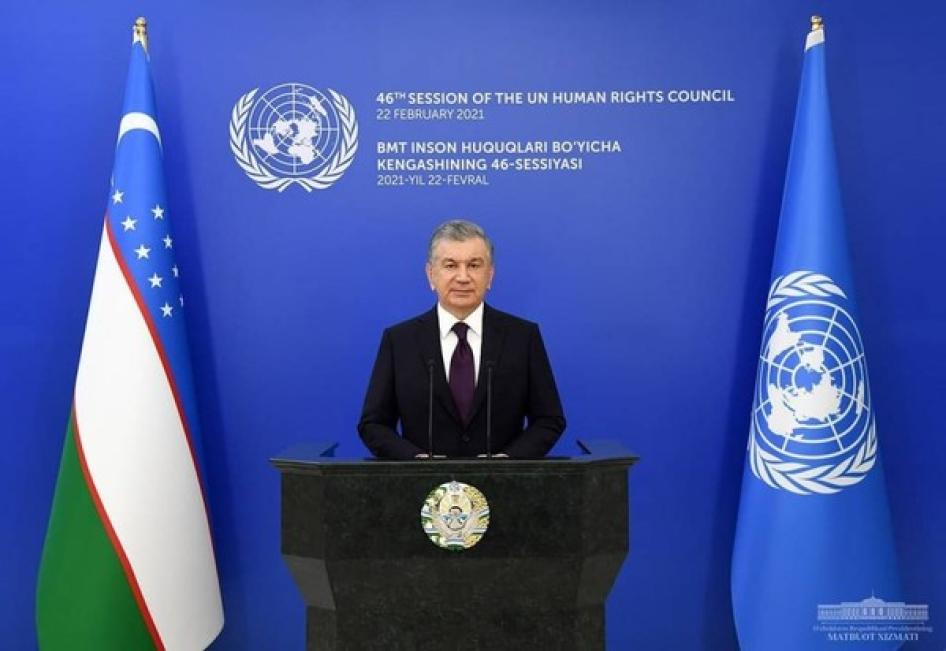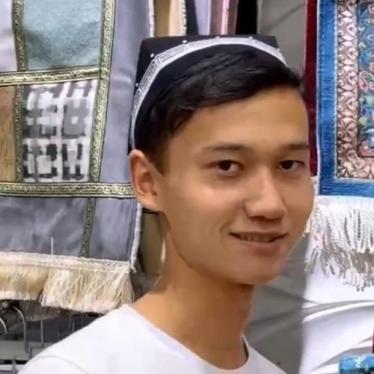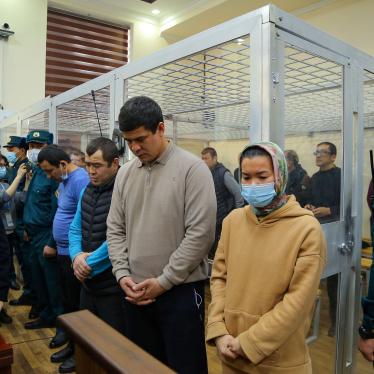There have been some areas of progress on human rights under Mirziyoyev but the country’s international partners should recognize that these gains have no halted and gone into reverse.
It turns out the “New Uzbekistan” declared by President Shavkat Mirziyoyev is looking increasingly like the old version many Uzbeks had hoped had been left behind.
Mirziyoyev is running for re-election on July 9 and is sure to win. He still presents himself as a reformer and has indeed whetted the appetite for change in the country of 35 million people, the most populous in Central Asia. But this Sunday’s election is a barometer of the reversal in hopes that were earlier pinned on Mirziyoyev.
His strategy of building a “New Uzbekistan,” initiated in 2021, aimed in part to “strengthen the role of civil society institutions (and) protect human rights.” Yet instead he has focused on consolidating the system of authoritarian power he inherited in 2016 from his predecessor, the brutal strongman Islam Karimov. Uzbekistan’s international partners should keep pressing for reforms, including on human rights, but should be ready to dial down cooperation if, as seems likely, Uzbekistan fully jettisons its reform path.
The election is step two in a choreographed plan to consolidate power this year. Step one came in April with a referendum on a new constitution that reset the clock on Mirziyoyev’s terms as president, enabling him to run for two more seven-year terms. Sunday’s vote will open the path for him to retain power possibly until 2037.
All this has been attended by a sense of déjà vu, given that back in 2002, Karimov held a similar referendum to extend his time in office.
Uzbekistan has never held elections deemed free and fair by credible election monitors. On June 26, the Organization for Security and Co-operation in Europe (OSCE), the region’s most authoritative election monitoring body, issued its Interim Report on preparations for the presidential election. It makes clear that Tashkent simply ignores concerns raised repeatedly by the OSCE – and echoed by other international partners – on securing the most basic human rights protections in the country.
The OSCE notes with concern that no opposition or independent candidates have been allowed to run against Mirziyoyev, which contradicts Uzbekistan’s claim to be expanding the rights of its citizens. The same concerns were raised ahead of the 2021 presidential election. This time around, the OSCE reports that one opposition party tried to register but was barred. “Party representatives reported intimidation and their leader was detained,” the OSCE says.
Just as in 2021, the OSCE election monitors also registered “concerns about freedom of assembly, association and expression, as well as the lack of independence of the judiciary.”
In the media sphere, “self-censorship remains pervasive, and some journalists and bloggers stated they face interference into editorial autonomy, threats and arrests.”
Before the 2021 presidential election there was hope among Uzbekistan’s international partners that once Mirziyoyev had won a new term, he would push forward with improvements in human rights and rule of law. The opposite has occurred, and conditions in some areas have worsened.
Planned improvements to the criminal code have stalled, registration arrangements for non-governmental organizations have worsened, and it remains a criminal offense for two men to have consensual sex.
Recent evidence reinforces these concerns. On June 5, a court rejected an appeal by Daulet Tazhimuratov, a blogger and lawyer from Karakalpakstan, an autonomous republic, against his 16-year prison sentence for alleged crimes linked to protests in the region in 2022 that left at least 21 people dead. However, Human Rights Watch has seen no evidence that Tazhimuratov did anything but exercise his right to peaceful free expression.
Tazhimuratov’s allegations of ill-treatment and torture in pretrial detention were never addressed during the trial nor investigated afterward. Furthermore, there has been no independent investigation into how the protest deaths occurred or genuine effort to find out who among the security forces was responsible.
Also in June, a new report by the Uzbek Forum, a non-governmental group, showed what Mirziyoyev’s professed tolerance of greater press freedom has meant in practice. It documents the cases of 10 bloggers, journalists, and social media activists who have faced threats, harassment, and prosecution. Some remain in detention, simply for doing their jobs and exercising free expression.
There have been some areas of progress on human rights under Mirziyoyev but the country’s international partners should recognize that the government has now halted or gone into reverse with its reform agenda.
The timing is challenging, as Uzbekistan is an important regional actor, in the context both of Russia’s war in Ukraine, and Afghanistan.
Yet for the European Union, the U.S., U.K. and others, standing up for human rights and standing by the people of Uzbekistan whose rights are being abused needs to be a central pillar of relations with Tashkent. For the EU in particular, deeper cooperation on reforms in democracy, the rule of law, and human rights are a core area of the EU’s enhanced partnership agreement with Uzbekistan, which was initiated a year ago. They are also obligations under an EU-Uzbekistan preferential trade deal.
These governments should make clear their human rights expectations and offer to help achieve them. But they should also be ready to put limits on their cooperation with Uzbekistan if – as is likely – these expectations are not met. It is important for the country’s current – and new – president to get the message that a “New Uzbekistan” has to be about deeds and not just words.









